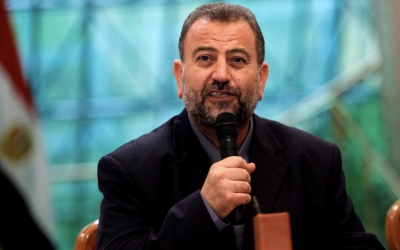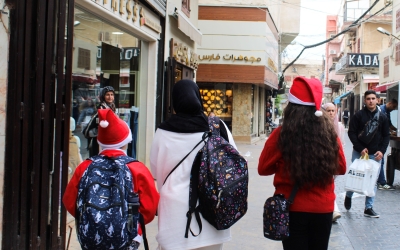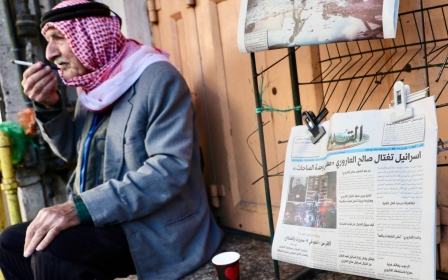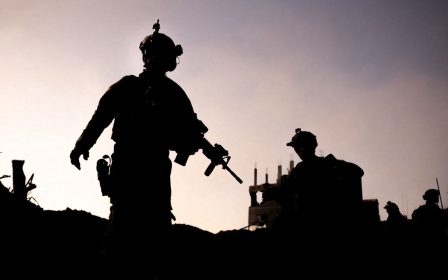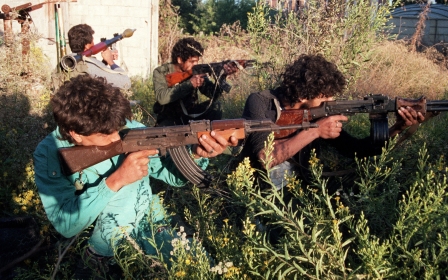War on Gaza: Will Hezbollah respond to the assassination of Hamas leader Saleh al-Arouri?
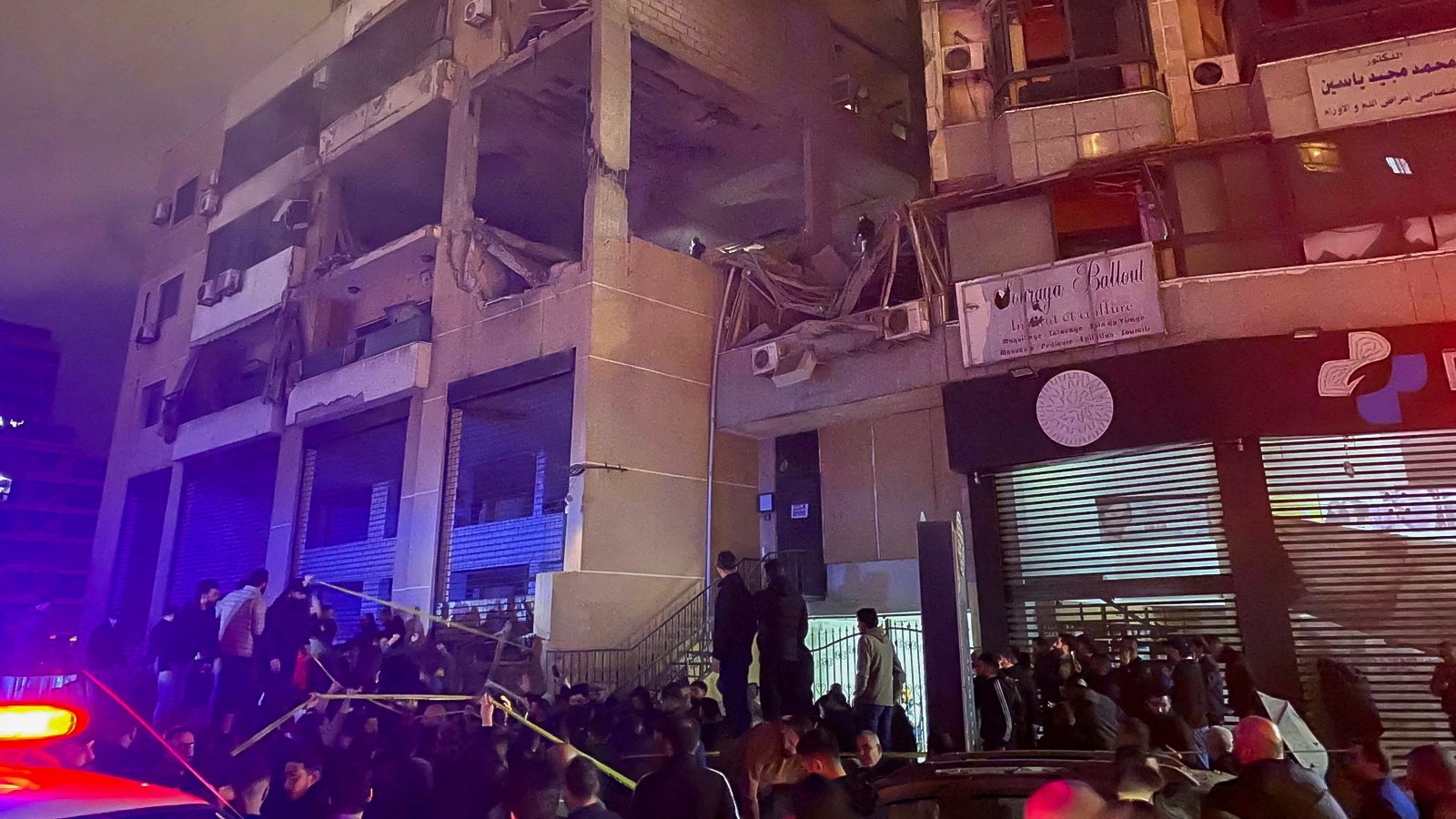
The assassination of senior Hamas official Saleh al-Arouri in Beirut’s Dahieh suburb sent shockwaves across Lebanon, where conflict with Israel has so far been largely contained to the border areas.
Arouri was the deputy chairman of Hamas' political bureau, and one of the founders of its armed wing, al-Qassam Brigades.
His assassination in Dahieh, a dense residential neighbourhood that also serves as a stronghold for Lebanese group Hezbollah, marks a significant escalation in the Lebanese theatre of the current Israeli war on Gaza.
The attack killed four Palestinians, including Arouri, and three Lebanese people. Two of the Palestinians killed were Qassam Brigade officers, while two of the Lebanese were from the group Jamaa al-Islamiya.
With Hezbollah promising "response and punishment" for the attack, many fear that Lebanon will be dragged into a full-blown war.
New MEE newsletter: Jerusalem Dispatch
Sign up to get the latest insights and analysis on Israel-Palestine, alongside Turkey Unpacked and other MEE newsletters
Israel, while not claiming responsibility for the attack, is reportedly preparing for a Hezbollah retaliation, which experts expect will be significant.
"It has to be an escalation," said Amal Saad, a Hezbollah expert and lecturer in politics at Cardiff University.
"It has to go above and beyond the types of attacks and tactics that it used so far. It obviously has to be qualitatively different."
Hezbollah's secretary general, Hassan Nasrallah, is expected to give a speech later on Wednesday for the commemoration of the assassination of Iranian general Qassem Soleimani by the US. Many now anxiously wait to hear him address Arouri's assassination.
Experts still expect the group's retaliation to fall short of an all-out war, as it remains adamant on avoiding this outcome.
Senior fellow at the Carnegie Middle East Center, Mohanad Hage Ali, believes that "Hezbollah has no interest in changing the course of events as they unfold in Gaza."
Hage Ali added that the group still primarily views this as a war taking place in Gaza, in which Hezbollah acts as secondary support.
"The trajectory is that Israel will lose this war," he added, "They [the Israelis] can't achieve their objectives, Hamas is still active in northern Gaza, it’s still striking Israeli forces, increasing the cost of the Israeli occupation of Gaza."
The decrease in international support for Israel also means that Hezbollah may not see a point in fully opening its front to include all of Lebanon.
It will, however, try to ensure Israel does not repeat the Dahieh attack.
"It's got to deter Israel from continuing this campaign because Israel has threatened to continue for years," Saad said.
The assassination of Arouri was followed on Wednesday by a twin bomb attack on a commemorative event for Soleimani in Iran's Kerman, which left more than 100 dead. Responsibility for the blasts is not yet known.
'It will not add to a fire'
A few weeks before the Beirut attack, Israeli officials, including Prime Minister Benjamin Netanyahu, announced plans to target Hamas officials anywhere in the world.
The head of Israel's internal security agency, the Shin Bet, even said in a leaked recording that their operations could take years, and would take place "in Lebanon, in Turkey, in Qatar, everywhere."
Additionally, as reports have come out revealing American concerns over Israel’s actions that may start a wider war in Lebanon, experts believe Hezbollah is trying to avoid giving its enemy what it wants.
'It's in Israel's hand to launch or start a war, otherwise Hezbollah will not initiate'
- Mohanad Hage Ali, Carnegie Middle East Center, Lebanon
"It will not add to a fire that was lit by the Israelis," Hage Ali said.
Israeli officials have repeatedly threatened Hezbollah and Lebanon ever since their border clashes started on 8 October, a day after Hamas' surprise attack on Israeli southern towns. Netanyahu even said they would “turn Beirut and south Lebanon” into “Gaza and Khan Younis” should a war break out.
Israel also demanded that Hezbollah's elite Radwan forces withdraw to the north of Lebanon’s Litani River, giving it a somewhat safe buffer zone, claiming it will do so by force if necessary.
While a war today could be detrimental to crisis-hit Lebanon, it may not necessarily result in Israel’s desired defeat of Hezbollah.
The group previously fought a war against Israel in 2006, ending with Israel failing to achieve its stated objectives. Since then, it has heavily increased its arsenal and gained years of combat experience in the Syrian civil war, fighting alongside the Syrian government.
Their current clashes with Israel has killed at least 140 Hezbollah fighters, an unclear number of Israeli soldiers and dozens of civilians on the Lebanese side. Israel's northern areas have been evacuated, and tens of thousands of Lebanese residents of southern towns have been internally displaced.
Some experts believe Hezbollah's retaliation could be in line with what the group and its allies have done following the assassinations of figures such as Iran’s Soleimani, where Iran fired several ballistic missiles on an American airbase in Iraq.
Saad believes that Arouri’s assassination is more related to Israel giving "the semblance of a symbolic victory to its public" amidst its lack of military achievements in Gaza.
"If it wanted to provoke an all-out war as a response from Hezbollah, I don’t think it would’ve just targeted a Hamas official," she said.
As for Hezbollah, Hage Ali claims "nothing" could trigger them into initiating a war unless Israel launches a complete invasion of south Lebanon or heavily bombs Dahieh.
"It's in Israel's hand to launch or start a war, otherwise Hezbollah will not initiate," he said.
This article is available in French on Middle East Eye French edition.
Middle East Eye delivers independent and unrivalled coverage and analysis of the Middle East, North Africa and beyond. To learn more about republishing this content and the associated fees, please fill out this form. More about MEE can be found here.


